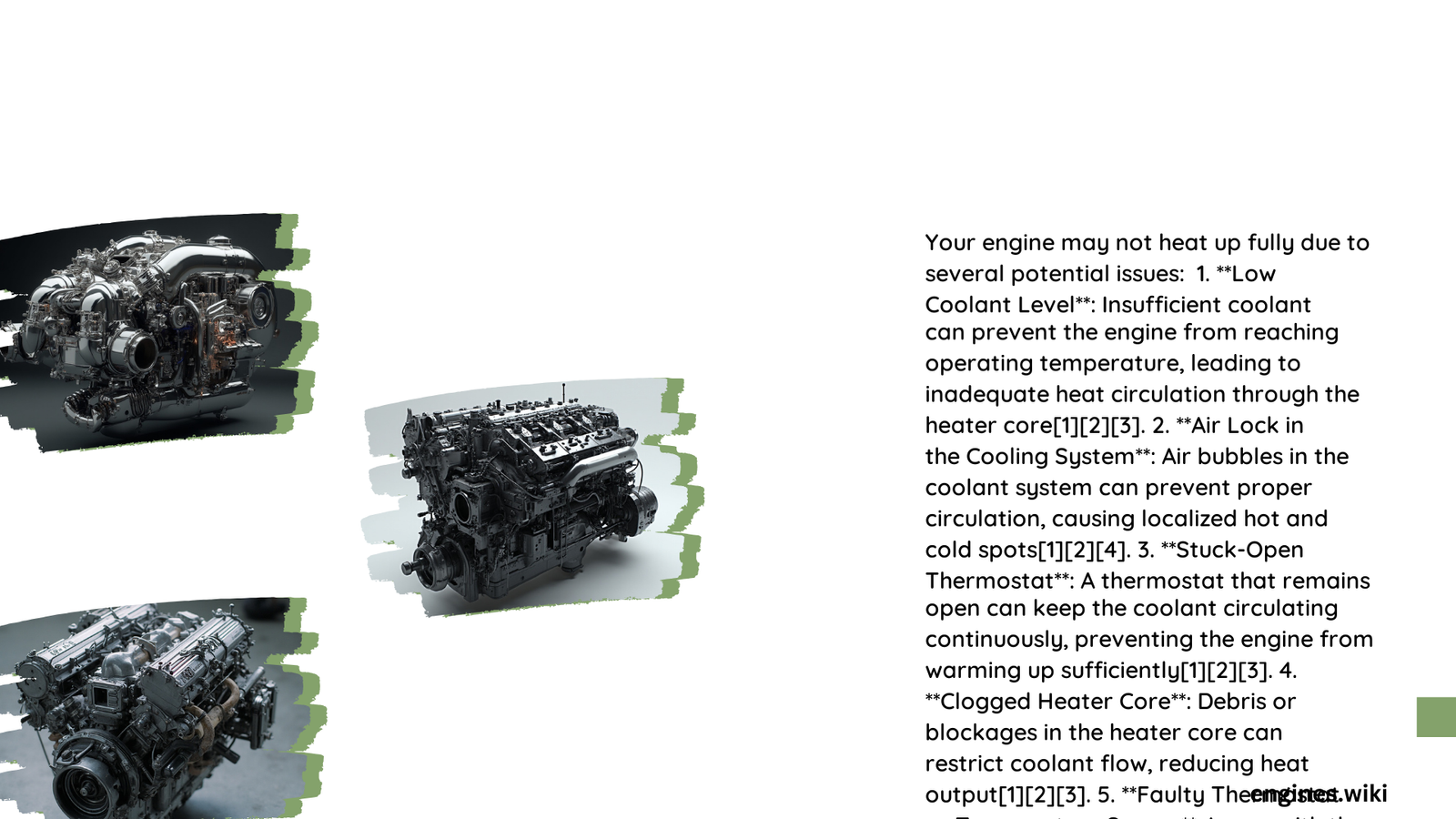An engine that won’t heat up fully can lead to poor performance, reduced fuel efficiency, and potential damage. This issue often stems from problems with the cooling system, thermostat, or related components. Understanding the causes and solutions for an engine that won’t heat up fully is crucial for maintaining your vehicle’s health and performance.
Why Does My Engine Fail to Reach Optimal Temperature?
Several factors can prevent an engine from heating up fully:
- Malfunctioning thermostat
- Low coolant levels
- Radiator issues
- Heater core blockages
- Faulty temperature sensors
Let’s explore each of these potential causes in detail.
What Are the Signs of a Faulty Thermostat?

The thermostat plays a crucial role in regulating engine temperature. Here are some signs that your thermostat might be the culprit:
- Temperature gauge fluctuations
- Engine overheating or overcooling
- Insufficient cabin heating
- Coolant leaks
- Unusual engine noises
How to Diagnose a Thermostat Problem
Follow these steps to diagnose a thermostat issue:
- Visually inspect the thermostat housing
- Monitor the temperature gauge
- Use an OBD2 scanner for error codes
- Check coolant levels and system integrity
- Replace the thermostat if necessary
How Does Low Coolant Affect Engine Temperature?
Low coolant levels can significantly impact your engine’s ability to heat up properly. Here’s why:
- Insufficient coolant reduces heat transfer efficiency
- Air pockets can form in the cooling system
- Engine components may not reach optimal operating temperatures
Coolant Capacity and Replenishment
| Vehicle Type | Typical Coolant Capacity |
|---|---|
| Sedan | 4-6 liters |
| SUV | 6-10 liters |
| Truck | 10-15 liters |
To replenish coolant:
- Ensure the engine is cool
- Locate the coolant reservoir
- Add the correct type and amount of coolant
- Consider a coolant system flush for maintenance
What Radiator Issues Can Prevent Proper Engine Heating?
Radiator problems can significantly affect engine temperature. Common issues include:
- Blockages from debris or mineral buildup
- Incorrect pressure in the cooling system
- Reduced coolant flow rates
Impact on Engine Temperature
- Overheating: Blocked radiators can cause severe engine damage
- Overcooling: Excessive coolant flow can prevent the engine from reaching optimal temperature
How Can I Diagnose and Resolve Heater Core Blockages?
Heater core blockages can contribute to heating issues. Here’s how to diagnose and resolve them:
Diagnostic Techniques
- Measure coolant flow rates
- Check temperature differentials
- Perform a visual inspection
Resolution Methods
- Flush the heater core using a specialized kit
- Replace the heater core if severely damaged or blocked
What Are Other Potential Causes of Engine Heating Issues?
- Faulty Water Pump: A malfunctioning water pump can’t circulate coolant effectively.
- Stuck Cooling Fan: If the cooling fan doesn’t engage properly, it can affect temperature regulation.
- Air in the Cooling System: Air pockets can prevent proper coolant circulation.
- Clogged Radiator Fins: Debris in radiator fins can reduce heat dissipation.
How Can I Prevent Engine Heating Problems?
To maintain proper engine temperature:
- Regular coolant checks and top-ups
- Periodic cooling system flushes
- Timely thermostat replacements
- Radiator cleaning and maintenance
- Addressing leaks promptly
By understanding these common causes and solutions for an engine that won’t heat up fully, you can better maintain your vehicle and prevent potential damage. Always consult a professional mechanic for complex issues or if you’re unsure about performing diagnostics or repairs yourself.
References:
1. https://motorad.com/top-signs-of-a-bad-engine-thermostat-and-how-to-fix-them/
2. https://www.jdpower.com/cars/shopping-guides/symptoms-of-a-bad-or-failing-thermostat
3. https://www.idolz.com/en/5-thermostat-failure-symptoms-and-how-to-avoid-them/
